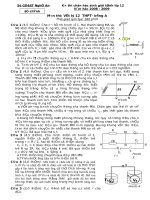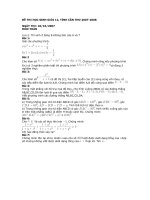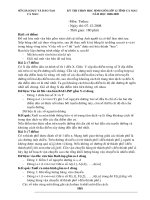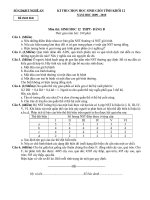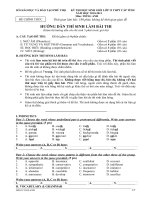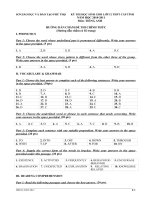De thi HSG 12 tinh Phu Tho
Bạn đang xem bản rút gọn của tài liệu. Xem và tải ngay bản đầy đủ của tài liệu tại đây (650.63 KB, 7 trang )
SƠ
̉
GIÁO DỤC VÀ ĐÀO TẠO PHÚ THỌ KỲ THI HO
̣
C SINH GIO
̉
I LƠ
́
P 12 THPT CẤP TỈNH
NĂM HỌC 2010-2011
Môn: TIẾNG ANH
Thơ
̀
i gian la
̀
m ba
̀
i: 180 phu
́
t, không kê
̉
thơ
̀
i gian giao đê
̀
HƯỚNG DẪN THÍ SINH LÀM BÀI THI
(Giám thị hướng dẫn cho thí sinh 5 phút trước giờ thi)
A. CẤU TẠO ĐỀ THI: Đề thi gồm có 4 phần chính:
I. NGỮ ÂM (Phonetics): Gồm có 2 phần (10 câu)
II. TỪ VỰNG VÀ NGỮ PHÁP (Grammar and Vocabulary): Gồm có 4 phần (60 câu)
III. ĐỌC HIỂU (Reading comprehension): Gồm có 3 phần (30 câu)
IV. VIẾT (Writing): Gồm có 2 phần (20 câu)
B. HƯỚNG DẪN THÍ SINH LÀM BÀI:
• Thí sinh làm toàn bộ bài thi trên đề thi theo yêu cầu của từng phần. Thí sinh phải viết câu
trả lời vào phần trả lời được cho sẵn ở mỗi phần. Trái với điều này, phần bài làm của thí
sinh sẽ không được chấm điểm.
• Đề thi gồm có 7 trang. Thí sinh phải kiểm tra số tờ đề thi trước khi làm bài.
• Thí sinh không được ký tên hoặc dùng bất cứ dấu hiệu gì để đánh dấu bài thi ngoài việc làm
bài theo yêu cầu của đề ra. Không được viết bằng mực đỏ, bút chì, không viết hai thứ
mực trên tờ giấy làm bài. Phần viết hỏng, ngoài cách dùng thước để gạch chéo, không
được tẩy xóa bằng bất kỳ cách gì khác (kể cả bút xóa màu trắng). Trái với điều này bài thi sẽ
bị loại.
• Thí sinh nên làm nháp trước rồi ghi chép cẩn thận vào phần bài làm trên đề thi. Giám thị sẽ
không phát giấy làm bài thay thế đề và giấy làm bài do thí sinh làm hỏng.
• Giám thị không giải thích gì thêm về đề thi. Thí sinh không được sử dụng bất cứ tài liệu gì
kể cả từ điển.
____________________________________________
I. PHONETICS
Part 1: Choose the word whose underlined part is pronounced differently. Write your answers
in the space provided . (5 pts)
1. A. booth B. south C. truth D. both
2. A. picked B. wicked C. licked D. ticked
3. A. games B. venues C. backgrounds D. biogas
4. A. ancient B. ancestor C. anchor D. ankle
5. A. food B. too C. good D. soon
Write your answers (A, B, C or D) here:
1. ____________ 2. ____________ 3. ____________ 4. ____________ 5. ____________
Part 2: Choose the word whose stress pattern is different from the other three of the group.
Write your answers in the space provided. (5 pts)
1. A. opposite B. insurance C. confident D. coconut
2. A. sympatheticB. conservative C. comparativeD. indifferent
3. A. informative B. competitive C. insensitive D. imitative
4. A. abandon B. constable C. frequency D. habitat
5. A. annoyance B. develop C. tomorrow D. sacrifice
Write your answers (A, B, C or D) here:
1. ____________ 2. ____________ 3. ____________ 4. ____________ 5. ____________
HSG12.2010-ANH
1/7
ĐÊ
̀
CHI
́
NH THƯ
́
C
II. VOCABULARY & GRAMMAR
Part 1: Choose the best answer to complete each of the following sentences. Write your answers
in the space provided. (30 pts)
1. "Some sugar?" ~ "_____"
A. No, no me! B. No, I don't. C. Thanks, I'd like. D. Yes, please.
2. I _____ the table for supper.
A. lied B. layed C. led D. laid
3. When Claudia saw such fantastic furniture, she couldn’t resist ____ a chest of drawers.
A. to buy B. bought C. buying D. buy
4. I want to know ____ drugs.
A. that you take B. if you take C. what you take D. do you take
5. Jeremy needed a long time to____ smoking.
A. get over B. get rid of C. get on D. get down
6. “Jasmine spent New Year’s Eve alone.” ~ “She ____ lonely!”
A. must had felt B. must feel C. must be feeling D. must have felt
7. You _____ come tomorrow if you have something else to do.
A. needn't B. mustn't C. needn't to D. don't need
8. _____ are famous for their cheese and butter.
A. The Dutch people B. Dutches C. The Dutches D. The Dutch
9. If you _____ such a long time to get dressed, we'd have been there by now.
A. weren't taking B. wouldn't have taken C. hadn't taken D. wouldn't take
10. _____ is often made of wood.
A. Furniture B. A piece of furnitures C. Furnitures D. Items of furniture
11. Big cities like New York and Tokyo are _____ populated.
A. greatly B. closely C. densely D. variously
12. Internet _____ has helped bloggers share their experiences and opinions easily and quickly.
A. linkage B. joiner C. communication D. connectivity
13. One _____ of the scheme is the very high cost.
A. advantage B. shortage C. drawback D. shortcoming
14. I'm going to be _____ with you, Mr Henderson. Your daughter is a thief.
A. sincere B. open C. frank D. genuine
15. These figures give you some idea of the cost of _____ your car for one year.
A. controlling B. handling C. managing D. maintaining
16. I had to pay _____ on a carpet I brought in through Customs today.
A. taxes B. rates C. fines D. duty
17. The child was _____ by a lorry on the safety crossing in the main street.
A. knocked out B. run across C. run out D. knocked down
18. Neil Armstrong was the first man to _____ foot on the moon.
A. try B. let C. put D. set
19. The programme on TV attracted millions of _____.
A. viewers B. audiences C. spectators D. witnesses
20. We have just built _____.
A. two public excellent tennis courts B. two excellent public tennis courts
C. two tennis courts excellent public D. two tennis public excellent courts
21. I find his behavior towards me quite _____. He treats me like an idiot.
A. offending B. insulting C. crude D. ill-mannered
22. I walked away as calmly as I could _____ they thought I was a thief.
A. in case B. or else C. to avoid D. owing to
23. I am afraid I’m rather _____ about the existence of ghosts.
A. skeptical B. partial C. adaptable D. incapable
24. In an effort to increase his newspaper’s _____, the editor introduced a weekly competition.
A. propaganda B. distribution C. circulation D. dispersion
25. _____ the invention of the steam engine, most forms of transport were horse-drawn.
A. Akin to B. Prior to C. In addition to D. With reference to
HSG12.2010-ANH
2/7
26. Well, we did have a terrible row but we’ve _____ it up now.
A. turned B. cleaned C. sorted D. made
27. The zoo _____ by the time we reach there.
A. closes B. will close C. will have closed D. is closing
28. They arrived at the little village only to find it _____.
A. deserted B. deserting C. is deserted D. deserts
29. _____ of the brothers wants to give in. Both are as stubborn as mules.
A. Both B. Either C. Neither D. Each
30. I didn't really want to see the film, but my sister was so _____ to go that I finally agreed.
A. willing B. sincere C. keen D. energetic
Write your answers (A, B, C or D) here:
1. ___________ 2. ___________ 3. ___________ 4. ___________ 5. ___________
6. ___________ 7. ___________ 8. ___________ 9. ___________ 10. ___________
11. ___________ 12. ___________ 13. ___________ 14. ___________ 15. ___________
16. ___________ 17. ___________ 18. ___________ 19. ___________ 20. __________
21. ___________ 22. ___________ 23. ___________ 24. ___________ 25. ___________
26. ___________ 27. ___________ 28. ___________ 29. ___________ 30. __________
Part 2: Choose the underlined word or phrase in each sentence that needs correcting. Write
your answers in the space provided. (20 pts)
1. The Girl Scouts, (A) found by Juliette Gordon Low (B) in 1912, (C) has grown to a current
membership of (D) more than three million girls.
2. The decathlon is a (A) two-day athletic competition which (B) consists of (C) ten types (D)
track and field events.
3. Fred Astaire (A) is said (B) to have been the most popular dancer (C) of his time, but he was also
a talented actor, (D) a singer, and choreographer.
4. (A) Provide (B) pensions for (C) retired people is (D) the primary function of the social
security system.
5. (A) Played (B) in few parts of the world outside of the United States, (C) the baseball (D) first
became an event in the Olympic Games in 1984.
6. Not only (A) the supply of mahogany has dwindled (B) markedly in the past ten years, (C) but
its (D) price has tripled during the same period of time.
7. We spent (A) a great deal of time looking through (B) a large number of books to help him find
(C) a few information about Bermuda, but he knew (D) most of it already.
8. His right hand (A) may have been badly injured and he probably (B) won’t (C) be able to type,
so I thought that I (D) will offer to do some typing for him.
9. (A) Not many people realize that a spider is (B) no insect because insects (C) don’t have eight
legs and (D) none of them make webs.
10. In (A) one class we had to do (B) a research on (C) the language used in (D) business.
Write your answers (A, B, C or D) here:
1. ____________ 2. ____________ 3. ____________ 4. ____________ 5. ____________
6. ____________ 7. ____________ 8. ____________ 9. ____________ 10. ___________
Part 3: Complete each sentence with one suitable preposition. Write your answers in the space
provided. (20 pts)
1. He’s come up with a new solution _____ the problem.
2. When the princess kissed the frog, it turned _____ a handsome prince.
3. The milk went _____ because it hadn't been put back in the fridge.
4. We had to turn _____ their invitation to lunch as we had a previous engagement.
5. He was a real friend to see me _____ my long illness.
6. “May I sit here?”~ "Yes, _____ pleasure."
7. He took _____ tennis and became very keen on it.
HSG12.2010-ANH
3/7
8. Jonathan takes _____ his father, you know. They are both very intelligent.
9. When I opened the envelope, I was delighted to find a cheque _____ $500.
10. They used to say of Errol Flynn that you couldn’t count _____ him: he would always let you
down.
Write your answers here:
1. ____________ 2. ____________ 3. ____________ 4. ____________ 5. ____________
6. ____________ 7. ____________ 8. ____________ 9. ____________ 10. ___________
Part 4: Supply the correct form of the words in bracket. Write your answers in the space
provided under this passage. (20 pts)
THE HISTORY OF TOYS
When did the first toys come into (1) _____ (EXIST) and what led to their development? Did
they represent an attempt by adults to make children happy, or did they arise from the various playful
(2) _____ (ACTIVE) of children themselves? As everyone knows, the young (3) _____
(FREQUENT) copy the (4) _____ (BEHAVE) of their elders, and, in their play, they often adopt
objects used by adults for entirely different purposes. These objects (5) _____ (COURAGE) the
child’s (6) _____ (IMAGINE) and lead to games in which everyday articles often play unusual and
(7) _____ (EXPECT) roles.
It is rather surprising that for an (8) _____ (EXPLAIN) of the origin of toys, we cannot turn
to folk stories. However, no traditional tale (9) _____ (RELATE) to the origin of toys exists, and so
our (10) _____ (KNOW) is restricted to archaeological study and limited evidence from documents.
Write your answers here:
1. ____________ 2. ____________ 3. ____________ 4. ____________ 5. ____________
6. ____________ 7. ____________ 8. ____________ 9. ____________ 10. ___________
III. READING COMPREHENSION
Part 1: Read the following passages and choose the best answer. (20 pts)
A. The rules of etiquette in American restaurants depend upon a number of factors: the physical
location of the restaurant, e.g., rural or urban; the type of restaurant, e.g., informal or formal; and certain
standards that are more universal. In other words, some standards of etiquette vary significantly
while other standards apply almost anywhere. Learning the proper etiquette in a particular type of
restaurant in a particular area may sometimes require instruction, but more commonly it simply requires
sensitivity and experience. For example, while it is acceptable to read a magazine in a coffee shop, it is
inappropriate to do the same in a more luxurious setting. And, if you are eating in a very rustic setting it
may be fine to tuck your napkin into your shirt, but if you are in a sophisticated restaurant this
behavior would demonstrate a lack of manners. It is safe to say, however, that in virtually every
restaurant it is unacceptable to indiscriminately throw your food on the floor. The conclusion we can
most likely draw from the above is that while the types and locations of restaurants determine etiquette
appropriate to them, some rules apply to all restaurants.
1. With what topic is this passage primarily concerned?
A. rules of etiquette. B. instruction in proper etiquette.
C. the importance of good manners. D. variable and universal standards of etiquette.
2. According to the passage, which of the following is a universal rule of etiquette?
A. tucking a napkin in your shirt. B. not throwing food in the floor.
C. reading a magazine at a coffee shop. D. eating in rustic settings.
3. What does the word “it” refer to?
A. learning the proper etiquette. B. clear instruction.
C. knowing the type of restaurant. D. sensitivity.
4. The author uses the phrase “safe to say” in order to demonstrate that the idea is _____.
A. somewhat innocent . B. quite certain.
C. very clever. D. commonly reported.
5. What is the author’s main purpose in this passage?
HSG12.2010-ANH
4/7
A. to assist people in learning sophisticated manners.
B. to describe variations in restaurant manners.
C. to simplify rules of restaurant etiquette.
D. to compare sophisticated and rustic restaurants.
B. Over the past 600 years, English has grown from a language of few speakers to become the
dominant language of international communication. English as we know it today emerged around 1350,
after having incorporated many elements of French that were introduced following the Norman
invasion of 1066.
Until the 1600s, English was, for the most part, spoken only in England and had not extended
even as far as Wales, Scotland, or Ireland. However, during the course of the next two centuries, English
began to spread around the globe as a result of exploration, trade (including slave trade),
colonization, and missionary work. Thus, small enclaves of English speakers became established and
grew in various parts of the world. As these communities proliferated, English gradually became the
primary language of international business, banking, and diplomacy.
Currently, about 80 percent of the information stored on computer systems worldwide is in
English. Two-thirds of the world’s science writing is in English, and English is the main language of
technology, advertising, media, international airports, and air traffic controllers. Today there are
more than 700 million English users in the world, and over a half of these are nonnative speakers,
constituting the largest number of nonnative users than any other language in the world.
6. What is the main topic of this passage?
A. the number of nonnative users of English.
B. the French influence on the English language.
C. the expansion of English as an international language.
D. the use of English for science and technology.
7. Approximately when did English begin to be used beyond England?
A. in 1066. B. around 1350. C. before 1600. D. after 1600.
8. According to the passage, all of the following contributed to the spread of English around the
world EXCEPT _____.
A. the slave trade. B. the Norman invasion.
C. missionaries. D. colonization.
9. Which of the following is closest in meaning to the word “constituting”?
A. looking over. B. setting down. C. doing in. D. making up.
10. According to the passage, approximately how many nonnative users of English are there in the
word today?
A. a quarter million. B. half a million. C. 350 million.D. 700 million.
Write your answers (A, B, C or D) here:
1. ____________ 2. ____________ 3. ____________ 4. ____________ 5. ____________
6. ____________ 7. ____________ 8. ____________ 9. ____________ 10. ___________
Part 2: Read the passage and then decide which word (A, B, C, or D) best fits each space. (20
pts)
Ever since humans have inhabited the earth, they have made (1) _____ of many forms of
communication. Generally, this expression of thoughts and feelings has been in the form of oral (2)
_____. When there is a language (3) _____, communication is accomplished through sign language
in which motions (4) _____ for letters, words, and ideas. Tourists, the deaf, and the mute have had to
(5) _____ to this form of expression. Many of these symbols of whole words are very picturesque
and exact and can be used internationally; spelling, however, cannot.
Body language (6) _____ ideas or thoughts by certain actions, either intentionally or
unintentionally. A wink can be a way of flirting or indicating that the party is only joking. A nod (7)
_____ approval, while shaking the head (8) _____ a negative reaction.
HSG12.2010-ANH
5/7
